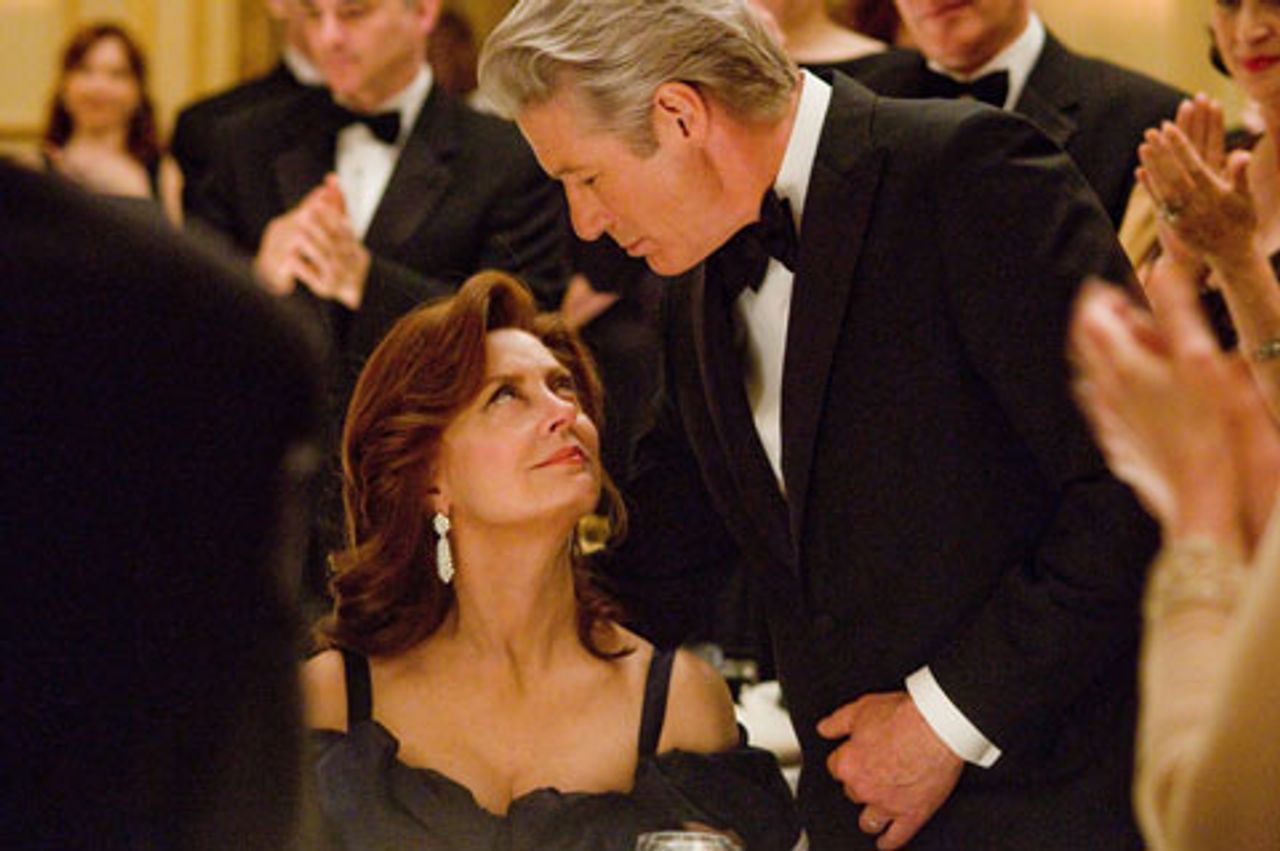Written and directed by Nicholas Jarecki
 Arbitrage
ArbitrageThe 2008 financial collapse and its ongoing consequences are shattering events in the lives of millions and therefore legitimate subject matter for artistic exploration. In fact, one could say, that their treatment is obligatory for film, fiction and drama taken as a whole.
A number of fiction films and documentaries have tackled this crisis, and its antecedents in Wall Street malfeasance in particular. While a definitive work has yet to appear, the better films nonetheless exhibit varying degrees of outrage at the selfish and criminal shenanigans that have hurled great numbers of people into poverty and misery.
Some of these movies are hard-hitting and sincere, while others pull their punches. At the very least, a film’s title generally indicates something about its central focus. For example, J.S. Chandor’s Margin Call is about the irrational and parasitical financial elite, as is Costa-Gavras’ new film, Capital, while Curtis Hanson’s Too Big to Fail and Charles Ferguson’s Inside Job (a documentary) are concerned with the banking meltdown.
On the other hand, writer-director Nicholas Jarecki’s debut feature Arbitrage is actually not about Wall Street wheeling and dealing, although the title seems likely to arouse interest and expectations along those lines. The movie proves to be less about financial transactions than about a personal moral dilemma drawn in broad, unconvincing strokes. If one can use the term “arbitrage” in relation to the film, it is only in the sense that its main character has to navigate between painful choices.
Deep-going, artistically rich exposés of banks, bankers and their damaging operations are urgently needed. Unfortunately, Jarecki’s film is largely a case of false advertising.
Richard Gere is Robert Miller, a Wall Street mogul and self-proclaimed investment “oracle.” On the surface, he is a devoted family man and philanthropist. That Forbes magazine features him on its cover is as it should be. His wife Ellen (Susan Sarandon) seems the perfect mate, while daughter Brooke (Brit Marling) is the beautiful, success-bound chief investment officer in his colossal enterprise.
In reality, Miller’s empire is failing and he is desperately trying to cover the loss incurred by a $400 million investment that went sour by cooking the books and selling the company. Further, he is amorously involved with Julie (Laetitia Casta), a young art gallery owner, whose business and elegant lifestyle have been underwritten by Miller.
During a late-night drive in the country, Miller nods off while behind the wheel of Julie’s car. The vehicle crashes and the woman is killed. An injured Miller leaves the scene of the accident and—with the help of Jimmy (Nate Parker), a black teenager whose late father he employed—surreptitiously makes his way back to Manhattan.
The police immediately suspect Miller, but Detective Michael Bryer (Tim Roth) trains his sights on a more vulnerable target, Jimmy. In the effort to entrap the young man, Bryer gets tangled in shady maneuvers of his own. Meanwhile Brooke discovers the investment firm’s irregular balance sheet just as Miller strenuously pushes for the sale of the business.
As a thriller, Arbitrage is dull despite its slick, shiny look. Most of the film’s drama is squeezed out of the legal hassles Miller unwittingly sets in motion for Jimmy. Although Miller’s woes are presumably the product of the 2008 crash, little about that experience or its aftermath makes its way into the film.
While the 25-year-old Jarecki may have wanted to capitalize on current anti-bank sentiment and interest, the film’s muddy, ambivalent attitude toward financial tycoons helps account for its untextured aesthetics and flat storyline. Those social criticisms Arbitrage does make are tepid and tinged with secret or not so secret appreciation.
In other words, the writer-director wants to have it both ways. On the one hand, Miller’s character is surely meant to tell us something about Wall Street swindling and criminality. On the other hand, out of Jarecki’s equivocation, the director reduces that aspect of his story to something of a sidebar.
The storyline reflects this. While Julie’s death is tragic, there is no organic connection between Miller’s life activity, as a banker-“oracle,” and his handling of the fatal car accident, much less Jimmy’s persecution. All sorts of people might find themselves in such circumstances. The result feels artificial as the filmmaker pumps the drama up into a phony, personal crisis.
As a whole, Arbitrage offers a templated portrait of a man who thinks he’s king of the world and can get away with anything. Any sharper insight generally gets lost in the clichéd melodrama.
Gere is credible as Miller, while Sarandon has little to do. Roth is annoying as a poor imitation of Peter Falk as Columbo.
The film’s confused, half-hearted attitude towards Wall Street criminality may be explained in part by the fact that Jarecki—brother of filmmakers Andrew and Eugene Jarecki and the son of a wealthy investor (most of the film was shot in his father’s Manhattan mansion)—is not socially or artistically distant enough from the universe of wealth and high finance.
The film’s cast, reflecting Arbitrage’s somewhat split personality, includes left-liberal figures even identified with the Occupy movement, such as Sarandon, along with those associated with the Wall Street boom and its media or cultural extension, such as Graydon Carter, the editor of Vanity Fair, and Maria Bartiromo of CNBC.
Arbitrage is an ultimately timid work that has its heart half in the world it purports to disparage. Is this really adequate, is this the best that can be done, given the present social catastrophe for millions?
